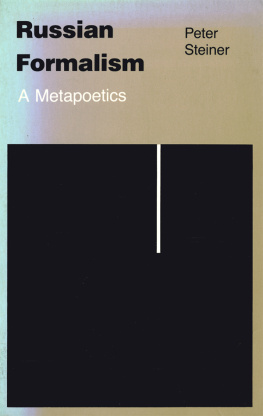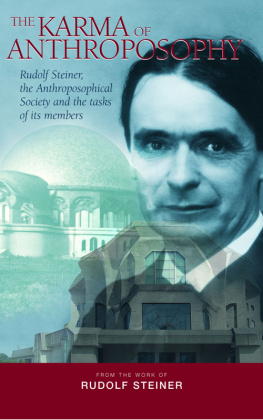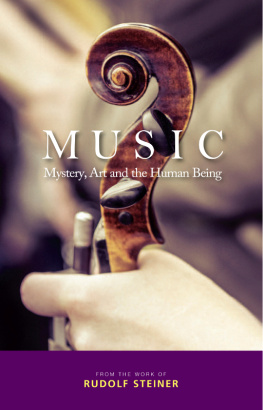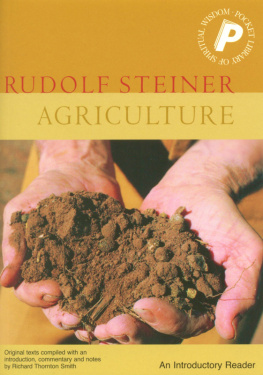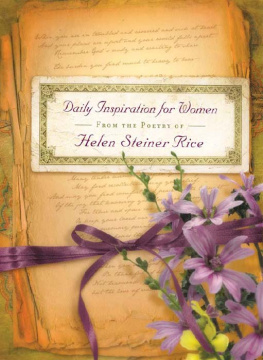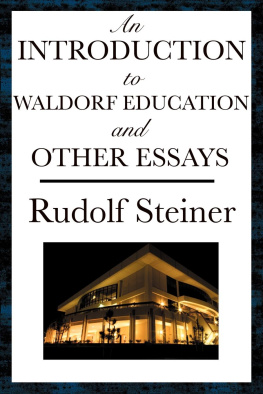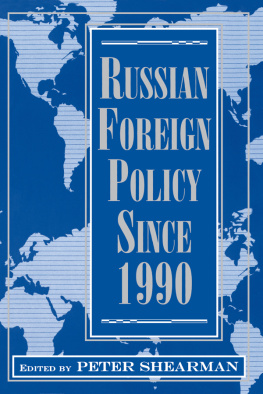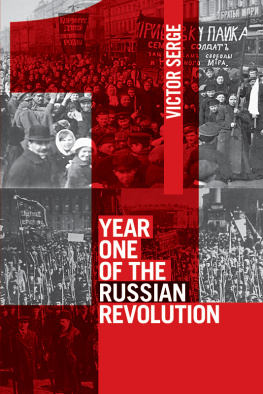PETER STEINER - Russian Formalism: a Metapoetics
Here you can read online PETER STEINER - Russian Formalism: a Metapoetics full text of the book (entire story) in english for free. Download pdf and epub, get meaning, cover and reviews about this ebook. year: 2016, publisher: Cornell University Press, genre: Detective and thriller. Description of the work, (preface) as well as reviews are available. Best literature library LitArk.com created for fans of good reading and offers a wide selection of genres:
Romance novel
Science fiction
Adventure
Detective
Science
History
Home and family
Prose
Art
Politics
Computer
Non-fiction
Religion
Business
Children
Humor
Choose a favorite category and find really read worthwhile books. Enjoy immersion in the world of imagination, feel the emotions of the characters or learn something new for yourself, make an fascinating discovery.
- Book:Russian Formalism: a Metapoetics
- Author:
- Publisher:Cornell University Press
- Genre:
- Year:2016
- Rating:3 / 5
- Favourites:Add to favourites
- Your mark:
- 60
- 1
- 2
- 3
- 4
- 5
Russian Formalism: a Metapoetics: summary, description and annotation
We offer to read an annotation, description, summary or preface (depends on what the author of the book "Russian Formalism: a Metapoetics" wrote himself). If you haven't found the necessary information about the book — write in the comments, we will try to find it.
Russian Formalism: a Metapoetics — read online for free the complete book (whole text) full work
Below is the text of the book, divided by pages. System saving the place of the last page read, allows you to conveniently read the book "Russian Formalism: a Metapoetics" online for free, without having to search again every time where you left off. Put a bookmark, and you can go to the page where you finished reading at any time.
Font size:
Interval:
Bookmark:
History as a scholarly discipline recognizes only a single source of its knowledge the word.
Gustav pet, History as an Object of Logic
These words of pets encapsulate the historians dilemma. Writing about a school of literary theory from the past, I indeed have nothing but words at my disposal and no Polonius as a whipping boy. Words are chameleons, declared the Formalist Jury Tynjanov, whose own words I shall soon have occasion to reclothe in my own language; his phrase in turn is borrowed from a famous Symbolist poet, with whose generation the Formalists had locked horns in an animated dialogue. Words change meaning as they pass from one context to another, and yet they preserve the semantic accretions acquired in the process.
Russian Formalism is just such a locus communis out of which the history of ideas is made. Such terms are used over and over again until their repetition lends them the air of solid, universally accepted concepts whose referential identity is beyond doubt. A closer scrutiny, however, reveals a different picture. On sifting through the myriad texts in which Russian Formalism occurs, I discovered a wide diversity of functions the term was meant to serve: for example, as a stigma with unpleasant consequences for anybody branded with it, a straw man erected only to be immediately knocked over, and a historical concept that on different occasions refers to very different literary scholars. Given the wide divergence of these speech acts (the preceding list can be easily augmented), Russian Formalism, far from serving as a stable basis for scholarly discussion, resembles more an empty sign that might be filled with any content.
Let me illustrate this contention with some concrete examples. Those we customarily call Formalists always rejected the label as a grossly misleading characterization of their enterprises. In his tongue-in-cheek essay, The Formal Method: In Lieu of a Necrologue, Boris Tomaevskij described the baptism of this movement:
Formalism screamed, seethed, and made a noise. It also found its own nameOPOJAZ. In Moscow it was called the Linguistic Circle (by the way, the Moscow linguists never called themselves Formalists; this is a Petersburg phenomenon).
It is worthwhile to say a few words about the name. Only its future biographer will have to decide who christened it the Formal method. Perhaps in those noisy days it itself courted this ill-suited designation. [But] Formalists who rejected the very notion of form as something opposed to content do not seem to square too well with this formula.
Boris jchenbaum voiced similar objections to the label Formal method in his gloves-off polemics with contemporary anti-Formalists:
First of all, there is obviously no Formal method . It is difficult to recall who coined this name, but it was not a very felicitous coinage. It might have been convenient as a simplified battle cry but it failed as an objective term that delimits the activities of the Society for the Study of Poetic Language (OPOJAZ) and the Section for Verbal Arts at the Institute for the History of the Arts.
What is at stake are not the methods of literary study but the principles upon which literary science should be constructed its content, the basic object of study, and the problems that organize it as a specific science.
The word form has many meanings which, as always, cause a lot of confusion. It should be clear that we use this word in a particular sensenot as some correlative to the notion of content (such a correlation is, by the way, false, for the notion of content is, in fact, the correlative of the notion volume and not at all of form) but as something essential for the artistic phenomenon, as its organizing principle. We do not care about the word form but only about its one particular nuance. We are not Formalists but, if you will, specifiers.
jchenbaum was not the only member of the Formal school to suggest a more fitting name. Morphological school, expressionist approach, and systemo-functional approach are only some of the labels concocted. This wealth of designations, however, indicates not merely dissatisfaction with the existing nomenclature, but a fundamental disunity in the movement itself. In part this disunity was a function of geography. From its very beginnings, Russian Formalism was split into two different groups: the Moscow Linguistic Circle with such young scholars as Ptr Bogatyrv, Roman Jakobson, and Grigorij Vinokur, and the Petersburg OPOJAZ, which included Boris jchenbaum, Viktor klovskij, and Jurij Tynjanov, among others. Even though their relations were cordial, the two groups approached literature from different perspectives. According to the Muscovites Bogatyrv and Jakobson, while the Moscow Linguistic Circle proceeds from the assumption that poetry is language in its aesthetic function, the Petersburgers claim that the poetic motif is not always merely the unfolding of linguistic material. Further, while the former argue that the historical development
The reorganization of scholarly life under the Soviet regime further encouraged these divergences. OPOJAZ was dissolved in the early twenties, to be incorporated into the State Institute for the History of the Arts in Petersburg. The Moscow Circletransformed by the departures of Jakobson and Bogatyrv in 1920 for Czechoslovakiabecame part of the State Academy for the Study of the Arts in Moscow. In these two research centers, the original Formalists began to collaborate with other students of literature and entered into an exchange of ideas with significance for both sides. Many Formalist notions were accepted by non-Formalists, and in turn, the Formalists modified their views in response to the intellectual trends around them. This dialogue produced a wide spectrum of literary-theoretical ideas labeled Formalist.
Though this dilution of pure Formalism occurred in both branches, it was the Muscovites who were most deeply influenced by the philosophical ideas propounded at the State Academy by Edmund Husserls pupil, Gustav pet. This intellectual cross-pollination gave rise to what some commentators have termed the formal-philosophical school of the late twenties, within whose orbit belonged such literary scholars as Michail Petrovskij, Grigory Vinokur, and Michail Stoljarov.
Given the vicissitudes of geography and history, the identity of Russian Formalism might be sought more profitably outside its organizational structures. One possibility advocated by Tomaevskij in his informative survey, The New School of Literary History in Russia, was to focus on the protagonists of this movement in order to distinguish the core of genuine Formalists from the peripheral fellow travelers:
It is people that one should consider now, rather than a school constituting an intellectual unity. Contemporary historians of literature can be classified, according to their relations with the new school, into three groups: the orthodox, the independents, and the influenced.
The orthodox are those faithful to OPOJAZ. They represent the extreme left of Formalism. The best known among them are klovskij, jchenbaum, and Tynjanov. The independents took part in the creation of the Formalist school and contributed to its works, but did not accept its discipline and went their separate ways: thus, irmunskij and Vinogradov. As for the influenced, it would be futile to pretend to specify their number.
The classification of the Formalists drawn by Tomaevskij has all the authority of an eye-witness account. Yet one wonders what the common denominator between klovskij and Tynjanov actually is. This question cannot be dismissed easily, for there are historians of the Formalist movement who see these key figures as quite dissimilar. Ewa Thompson, for example, divides the Russian Formal school into idealistic and positivistic trends, with klovskij gravitating toward idealistic aesthetics and Tynjanov a clear-cut representative of the positivistic And although to their contemporaries the difference between the two men might have appeared unimportant, within Striedters developmental scheme it is of great significance. According to Striedter, klovskij stands as the orthodox Formalist, whereas Tynjanov turns out to be the John the Baptist of Structuralism.
Font size:
Interval:
Bookmark:
Similar books «Russian Formalism: a Metapoetics»
Look at similar books to Russian Formalism: a Metapoetics. We have selected literature similar in name and meaning in the hope of providing readers with more options to find new, interesting, not yet read works.
Discussion, reviews of the book Russian Formalism: a Metapoetics and just readers' own opinions. Leave your comments, write what you think about the work, its meaning or the main characters. Specify what exactly you liked and what you didn't like, and why you think so.

